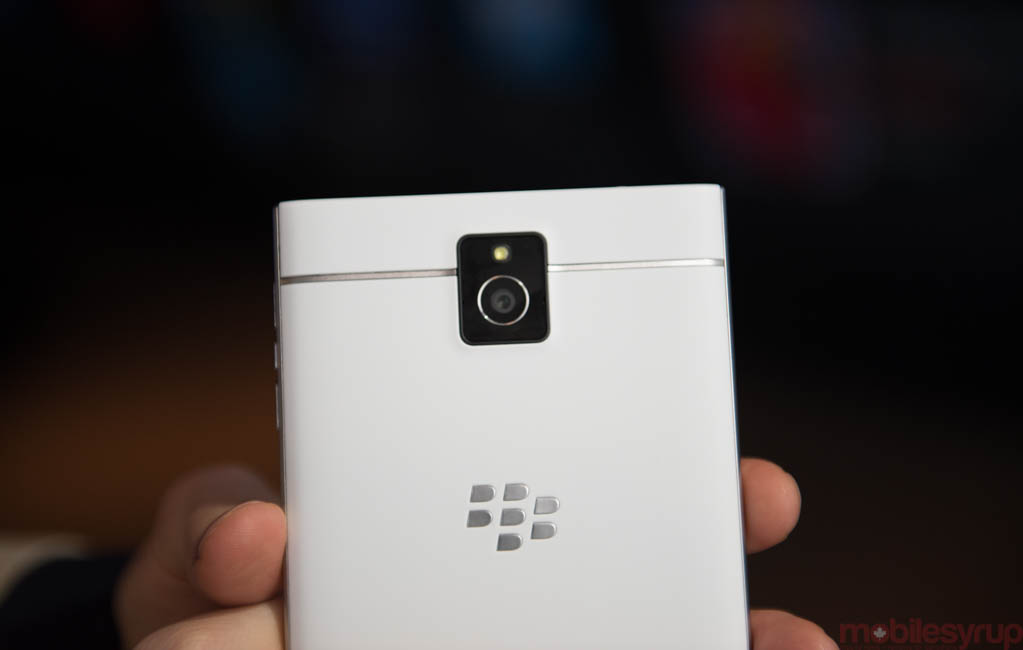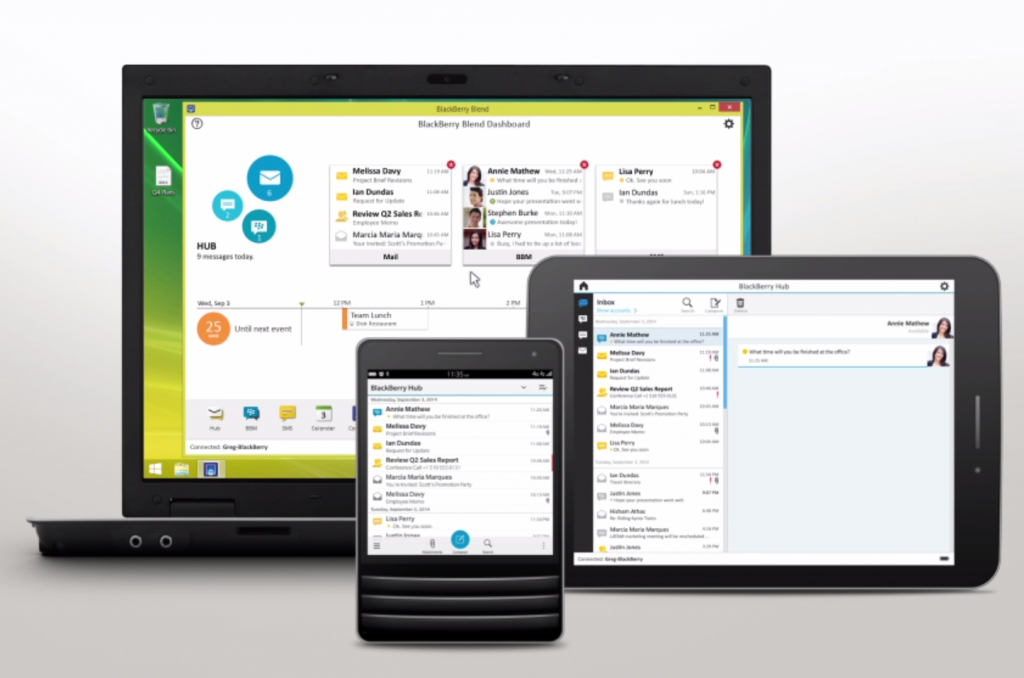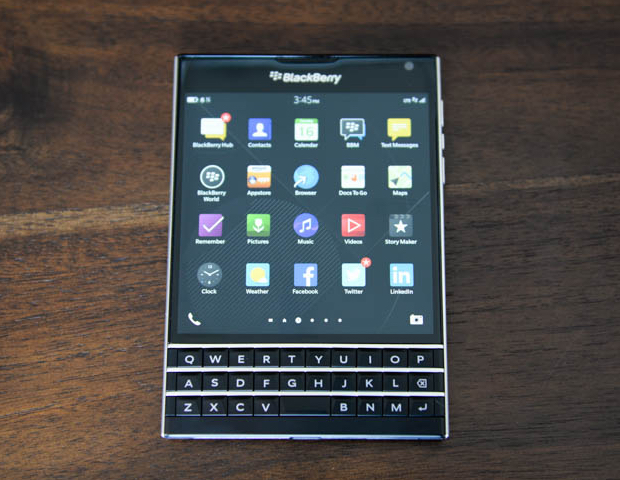
Welcome to Tête-à-Tête, a series where two of our writers converse on interesting topics in the mobile landscape — through chat. Think of it as a podcast for readers.
This week, Daniel and Douglas chat about BlackBerry’s new hardware, and how it fits with the company’s transition to an enterprise services company.
Douglas Soltys: Daniel, I’m exhausted. Between the two of us, 7000+ words were written this week on the BlackBerry Passport, BlackBerry Blend, BlackBerry design… etc. I’m almost BlackBerry’d out.
Almost. Today’s Passport press event answered a few questions, raised a few more, put BlackBerry’s transition into better focus, but left me confused about their device strategy. So I come to you wishing to squeeze blood out of a stone: I want to talk more BlackBerry.
Let’s start with the easy stuff. John Chen has now been at BlackBerry’s helm for a mere 10 months. In that time, he’s devised and implemented a technology strategy, a financial strategy, and distribution strategy, while also refusing to can the Passport, BlackBerry’s first truly impressive piece of hardware since the Bold 9000. He’s also the company’s most affable CEO, able to handle public speaking events with humour and candour. Obviously Chen gets high marks for effort and execution, but has it been enough? Has BlackBerry successfully transitioned into an enterprise services company?
Daniel Bader: Chen’s approach is both consumer-friendly and enterprise-focused, a winning combination. He’s also likely to get the company back into the black earlier than expected, finding revenue in areas the company has traditionally dithered in the past.
Specifically, I was impressed with the crossover potential of Blend as a way to drive subscriber revenue. Though the service is free for individual users, the company will begin charging a premium for enterprise-specific features, similar to the way BBM Protected builds on BBM’s speed with added security. It’s the free-to-play of the enterprise world.
I’m impressed that BlackBerry is no longer trying to do too many things; its focus is what’s keeping the lights on. Passport and Classic; BBM and eBBM Suite; BES 12. Chen’s biggest virtue is that he’s not overextending the company.
The Passport’s hardware impressed me, but as you saw in my massive review the QNX-based OS is still the company’s Achilles Heel. But software can be fixed; hardware is forever (or at least until the next contract). I have a feeling BlackBerry loyalists feeling pretty good about their company right now.

Douglas: Okay, let’s talk software. I think we’re agreed that we can view both the BlackBerry Passport and BlackBerry Blend can be send as end-points designed to drive BES12 server installs, because services are (and have always been) BlackBerry’s bread and butter. Which is why I was disappointed to see Blend ‘one more thing’d’ at the end of a Passport-focused event rather than more thoroughly integrated into the company’s narrative.
Placing software at the head of the narrative would likely save BlackBerry from some of the messaging headaches it still faces despite its newfound CEO’s charm. Director of Product Marketing Jeff Gadway painstakingly laid out core features of BlackBerry 10.3 designed to appeal to productivity workers in a granular level of detail and all the press wanted to talk about was hardware: Passport vs. the upcoming BlackBerry Classic most specifically.
Now I get the some of the reasons for that. Enterprise software is neither sexy nor easy to explain – you either have to use it to get it, or be walked through it with a granularity that would drive most people mad – and Chen did BlackBerry no favours by teasing the BlackBerry Classic or saying that it will sell more than the Passport.
But it’s the software, not the hardware, that BlackBerry needs to lock its customers into, which has me a little concerned. All of the Blend and 10.3 features (especially BlackBerry Assistant) demonstrated today were 100% focused towards BlackBerry’s target customer, but I’m not sure if they’re compelling enough to have users jump ship from iOS or Android. And as your Passport review so aptly points out, BlackBerry 10’s continued issue with consumer-focused features, despite the addition of the Amazon App Store, means that switching to BlackBerry takes as much off the table as it adds. BlackBerry 10 has matured in leaps and bounds over the last year and a half, but has it matured enough for BlackBerry to move enough product to become profitable?
Daniel: I think it’s important to point out that QNX is without a doubt a strong foundation for an operating system, but it’s no longer OK to offer the bare minimum of features, even for a productivity-focused business smartphone. I probably didn’t sufficiently relay this in the review, either, but I found BlackBerry 10.3’s performance to be disappointing, with apps often taking ages to load, or crashing out for no reason. Even the Hub, that always-accessible depot for content, stuttered, crashed and failed to show content properly. I’m by no means trying to slag the company, but I found it disturbing that the Passport’s hardware was the most reassuring aspect of BlackBerry’s announcements today.
The reason I gave the software such a harsh go was because I don’t believe “mobile professionals,” as John Chen calls the Passport’s targeted demographic, can be viewed any longer in a vacuum. These potential customers, many of them currently iOS or Android users, have the same fundamental needs as any other smartphone owner, and the BlackBerry brand no longer holds the same sway amongst security or enterprise professionals as it once did. MDM providers can accomplish just as much, nearly as easily, on an iPhone or Android, and in light of IBM’s new partnership with Cupertino, BlackBerry can’t just glide on the BES name.
Chen’s doing a great job keeping the company focused on the enterprise, but the Passport’s software is an example of a company still competing with itself. Including the Amazon Appstore is, in theory, a great way to take the onus off BlackBerry’s own waning developer community, but in so doing it creates a chaotic and untenable vortex of half-working apps and inevitable user disappointment. That isn’t the BlackBerry we want to see in 2014, neither is it the BlackBerry John Chen wants, I’m sure, to manage.

Douglas: I did find myself often holding the Passport and thinking that ‘if this were an Android phone, it would sell like hotcakes.’ BlackBerry’s OS has always been the most difficult to evaluate, because it’s not built for us, and many of its features can only fully be experienced and judged in a work environment.
But I agree with your point that BlackBerry’s “mobile professionals” target demographic share our mobile needs, even if they may also have additional ones. That’s why for the life of me I don’t understand why BlackBerry thinks the Classic is necessary, and I especially don’t understand why they think it will outsell the Passport. Will these mobile professionals, who didn’t upgrade to the BlackBerry Q10, suddenly crave the Q20 because it has a trackpad and dedicated call buttons? I find it hard to believe, as BlackBerry 10 was built for touch, not trackpads. In my retrospective, I pointed to the troubles BlackBerry has historically found itself in when the company fails to make strong choices, opting instead to try and balance the wishes of everyone in a single device. The BlackBerry Classic is a capitulation that fails to move BlackBerry forward.
Dammit, if BlackBerry is an enterprise services company how did our software conversation turn back into a discussion of hardware? Either we’re as hardware-focused as the rest of the tech media, or BlackBerry has yet to complete its transition. Let’s see what Chen can do with another 10 months at the helm.
MobileSyrup may earn a commission from purchases made via our links, which helps fund the journalism we provide free on our website. These links do not influence our editorial content. Support us here.


